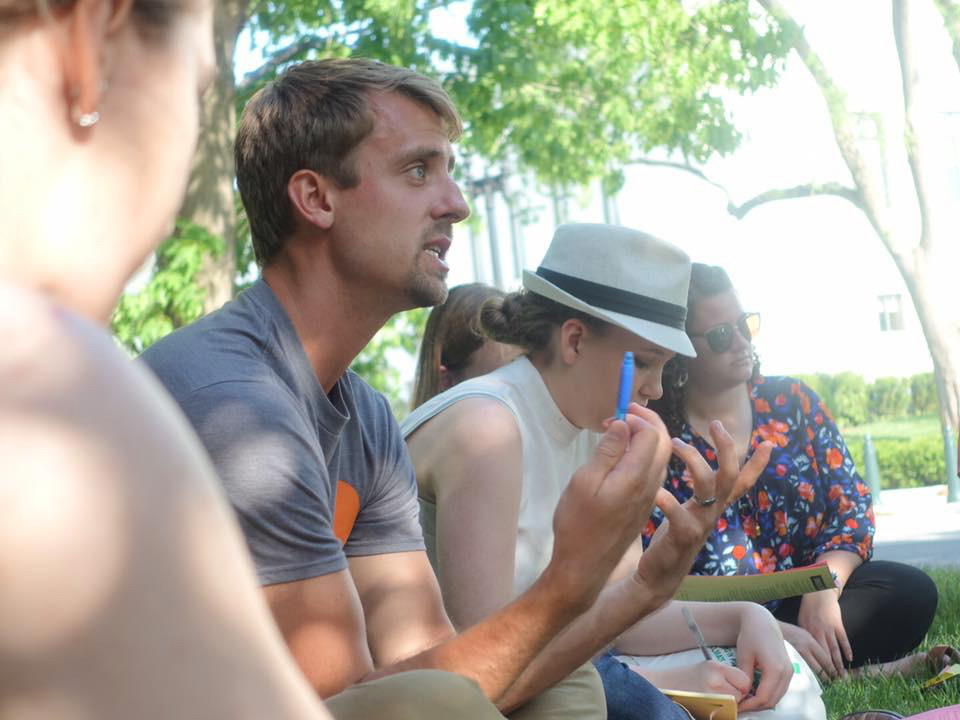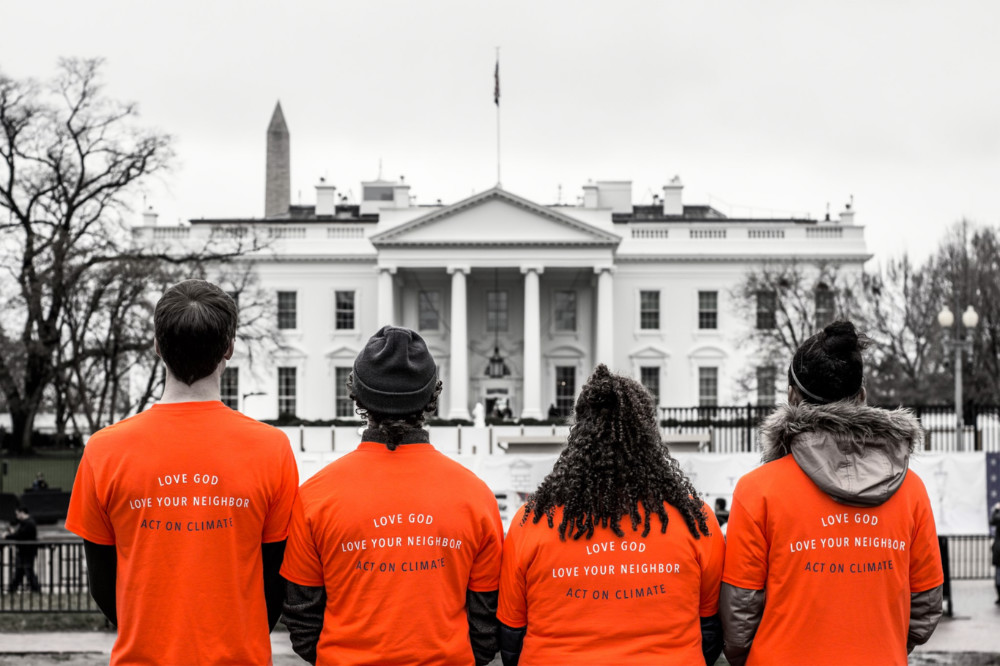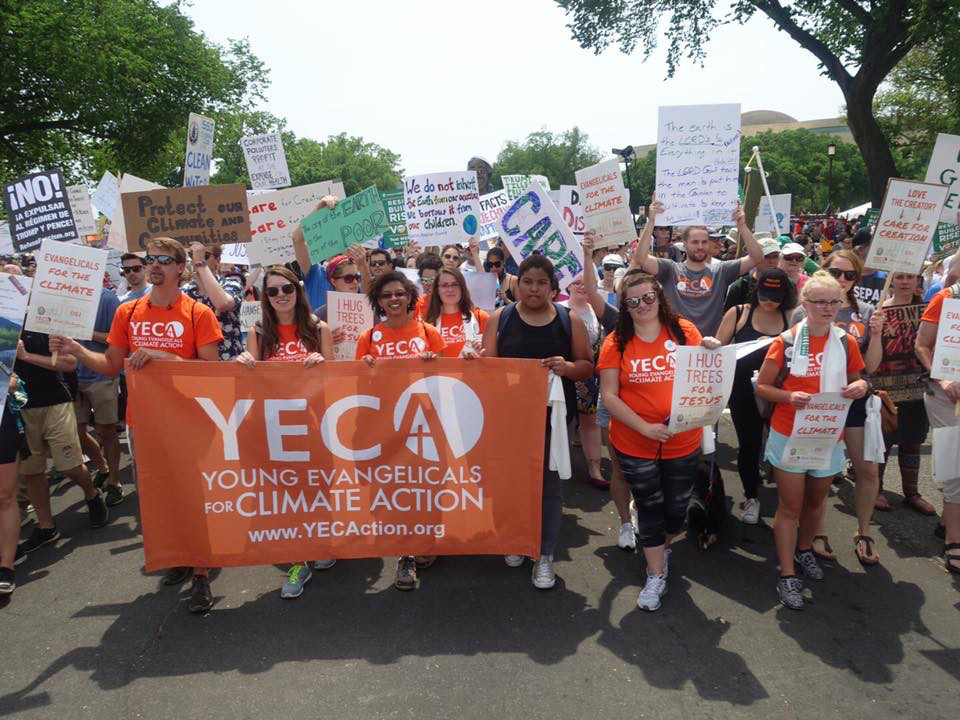
LAURIE GOERING, of Thomson Reuters Foundation, reports on how some young evangelicals in the US are working to win over other evangelicals with regard to supporting climate action as an expression of their faith…
Growing up in a conservative Christian home and school, Kyle Meyaard-Schaap learned a lot about scripture and its values but “almost nothing about climate change”, he remembers.
The US evangelical movement he belongs to has long stood out in public opinion polls both for its backing of conservative Republican politicians and its doubts about climate change, in a nation where views on the issue remain deeply partisan.
But in Meyaard-Schaap’s religious community in Michigan, “climate change wasn’t explicitly maligned – it was just ignored”, said the now 31-year-old. “My overwhelming experience was silence,” he told the Thomson Reuters Foundation by phone.
That changed when his brother returned “transformed” from a semester studying faith and ecology in New Zealand, convinced environmental action was “not a jettisoning of the values we had been taught but an effort to live more fully into them”.

Kyle Meyaard-Schaap leads a planning session in Washington for evangelical students before they meet with their members of Congress in 2017. PICTURE: Kaleb Nyquist
Today, Meyaard-Schaap is among those at the forefront of efforts to win over a bigger share of the politically powerful evangelical movement to supporting climate action as an expression of their faith.
As vice president of the Evangelical Environmental Network, Meyaard-Schaap is working to persuade more of his community that caring about climate change is in line with their fervent beliefs and “our faith calls for us to do something about it”.
“Shifting even a handful of [evangelicals] can be really important and necessary. This is a really strategic and important constituency that can have a disproportionate impact on the federal conversation around climate change.”
– Kyle Meyaard-Schaap, vice president of the Evangelical Environmental Network.
It is a slow process but one that could unlock the broader US political support crucial to drive forward Democratic President Joe Biden’s ambitious climate agenda.
“Shifting even a handful of [evangelicals] can be really important and necessary,” said Meyaard-Schaap, a lanky, amenable organiser who still lives in Michigan.
“This is a really strategic and important constituency that can have a disproportionate impact on the federal conversation around climate change,” he added.
White evangelical Christians make up about a quarter of US voters and are a powerful enough block that election exit polls single them out.
In the 2016 presidential elections, 80 per cent of them voted for Donald Trump, according to the Edison Research polling service, helping sweep a climate science denier into office.
But when Biden unseated Trump in the US presidential race last year, Trump’s evangelical support had slipped to 76 per cent, with some significant shifts in swing states like Georgia and Michigan that decided the 2020 elections.
Frustration with Trump’s handling of the coronavirus pandemic and ethical questions surrounding his presidency certainly contributed to that swing.

Members of Young Evangelicals for Climate Action in Washington DC at a Climate Die-In vigil they hosted at the White House in January, 2020. PICTURE: Luke Overstreet
But Jim Ball, founder and co-chair of the campaign Evangelicals for Biden, thinks rising concern about climate change, particularly among younger evangelical voters, also played a role.
In Georgia, which ultimately decided the presidential election, more than 100,000 evangelical voters switched parties, Ball said, in a state where Biden won by 12,670 votes.
Evangelicals are still strongly Republican, but “when people say evangelicals are dead-enders on climate, I say we have way more people than we need to create a movement, and to play our part,” added Ball, an evangelical minister.
Shifting political views on climate change are evident in the US Congress, where a decade ago, “the official Republican Party line was doubt that climate change was even occurring,” Meyaard-Schaap noted.
Now, Republicans are introducing their own climate change bills, he said – and pressure on the issue from core voting groups, including some evangelicals, is part of the reason.
Growing support from within Republicans’ own constituencies makes them “feel safe stepping out” and taking climate action, said Meyaard-Schaap, who until February led his organisation’s youth subsidiary, Young Evangelicals for Climate Action (YECA).
During his nearly five years in that role, he saw first-hand how young evangelicals helped spark political shifts.
In a meeting with former Senate majority leader Mitch McConnell’s chief of staff in 2017, one young evangelical warned that despite his own conservative views, “I cannot claim today’s Republican Party because it’s left me behind on climate change.”
“You could see the smile on the chief of staff’s face falter,” Meyaard-Schaap remembered.
“Here were young evangelicals…saying you’ve lost us – your irrational position on climate change means you’re losing an entire generation of your most dedicated voters.”

Members of Young Evangelicals for Climate Action at the People’s Climate March in Washington in 2017. PICTURE: Kaleb Nyquist
Evangelical youth have similarly pressed older church leaders to drop their opposition to climate action.
When YECA members noticed in 2015 that the 40 million-member National Association of Evangelicals had no official position on global warming, they wrote to hundreds of church leaders, asking them to pass a resolution acknowledging climate threats.
But the head of one particularly conservative denomination blocked the resolution – until a young activist from the denomination sent him a filmed “climate testimony”, saying he saw “creation care” as central to his own religious calling.
Moved, the leader agreed to abstain from voting on the resolution, which went on to pass.
As they age, young evangelicals will assume leadership positions, removing such roadblocks, Meyaard-Schaap said. But with a swift response to climate threats needed, established church officials also have to be won over.
Youth are telling them, “we have to start putting some of this silliness aside and start taking action to defend our kids, and do what Jesus said about loving our neighbours,” he said.
On climate action, “we know we don’t have a big enough choir yet so we have to build a bigger choir loft”, he added, both within the evangelical religious movement and more broadly.
Ball said young people “have a unique moral authority” to demand climate action, as they will face the impacts of climate decisions taken – or put off – today.
“They can influence their leaders, their grandparents, their parents. That’s why they’re so strategic,” he said.





